

Paul Chancey Gowan
Buckminster Fuller and Spaceship Earth.
Mitchy's Maize. Mitchy's Maize Quest. Assistant. Math related. WSSG Design Academy. Educational Electronic Games Rubric. The Great Conversation Bot. Shelter. For Mentors. Skip navigation Skip to main content SAFE | State Agencies | Online Services Follow Home > Teaching > Resident Educator Program > For Mentors For Mentors Thank you for being a vital part of the Ohio Resident Educator Program!
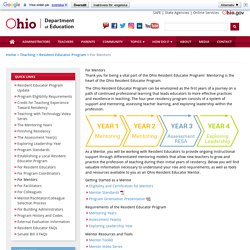
The Ohio Resident Educator Program can be envisioned as the first years of a journey on a path of continued professional learning that leads educators to more effective practices and excellence in teaching. As a Mentor, you will be working with Resident Educators to provide ongoing instructional support through differentiated mentoring models that allow new teachers to grow and practice the profession of teaching during their initial years of residency.
Getting Started as a Mentor Requirements of the Resident Educator Program Mentor Resources and Tools More Information about the Resident Educator Program Last Modified: 2/14/2017 2:46:23 PM. The Fourth Industrial Revolution: what it means and how to respond. We stand on the brink of a technological revolution that will fundamentally alter the way we live, work, and relate to one another.
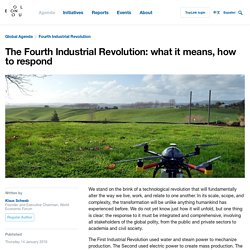
In its scale, scope, and complexity, the transformation will be unlike anything humankind has experienced before. The Conscious Competence Ladder - Learning Skills from MindTools.com. Also called the Conscious Competence Matrix, the Learning Matrix, and the Four Stages of Learning © GettyImagesstocknroll Take the first steps on the "Ladder of Learning.
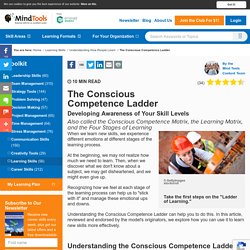
" When we learn new skills, we experience different emotions at different stages of the learning process. At the beginning, we may not realize how much we need to learn. Four stages of competence - Wikipedia. In psychology, the four stages of competence, or the "conscious competence" learning model, relates to the psychological states involved in the process of progressing from incompetence to competence in a skill.
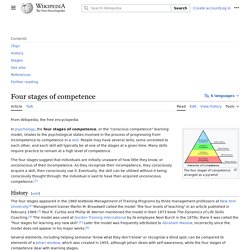
History[edit] The Four Stages of Learning provides a model for learning. It suggests that individuals are initially unaware of how little they know, or unconscious of their incompetence. As they recognize their incompetence, they consciously acquire a skill, then consciously use it. Eventually, the skill can be utilized without it being consciously thought through: the individual is said to have then acquired unconscious competence.[3] Several elements, including helping someone 'know what they don't know' or recognize a blind spot, can be compared to some elements of a Johari window, although Johari deals with self-awareness, while the four stages of competence deals with learning stages.
The four stages of competence[edit] See also[edit] References[edit] Pedagogy. Artificial Intelligence and Tutoring Systems. 197 Educational YouTube Channels You Should Know About - InformED : ETE 653 Models of Instruction. Education Technologies. Top 10 Free Training Courses for Online Teachers. Are you a “face to face” classroom teacher considering shifting to online education?
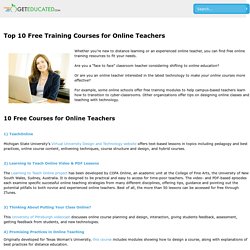
Online education. #OER Collections. Parla.AI - an artificial intelligence teacher. Interactive Smart Boards. Google Expeditions. Project approach – SHEILA. AR Réalité Virtuelle. REALIDAD AUMENTADA. CULTIVATE 11/10/17 Stakeholders strategize ways to prevent MLN in West Africa. Press release by International Institute of Tropical Agriculture.
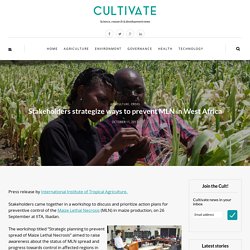
Stakeholders came together in a workshop to discuss and prioritize action plans for preventive control of the Maize Lethal Necrosis (MLN) in maize production, on 26 September at IITA, Ibadan. The workshop titled “Strategic planning to prevent spread of Maize Lethal Necrosis” aimed to raise awareness about the status of MLN spread and progress towards control in affected regions in East Africa. The MLN disease, which appeared in the region in 2011, was first reported in Kenya. The disease has caused major losses to maize crops of up to 90%, resulted in an estimated grain loss of 126,000 tons valued at $52 million in Kenya alone, and decreased food security. This emerging threat is now endemic in much of East Africa, and has been reported and confirmed in DR Congo, Ethiopia, Kenya, Rwanda, South Sudan, Tanzania, and Uganda. During the plenary session, there was a discussion on strategies for MLN prevention and preparedness.
101 Innovations in Scholarly Communication: How researchers are getting to grip with the myriad of new tools. There has been a surge of new scholarly communication tools in recent years.
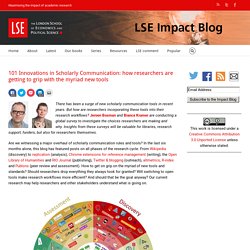
But how are researchers incorporating these tools into their research workflows? Jeroen Bosman and Bianca Kramer are conducting a global survey to investigate the choices researchers are making and why. Insights from these surveys will be valuable for libraries, research support, funders, but also for researchers themselves. 10 Mobile Apps Instructional Designers Should Be Familiar With - eLearning Industry. Many Instructional Designers already use mobile devices in their eLearning strategy.

They give online learners the power to access valuable online resources and improve their skills from anywhere in the world. However, we can also use mobile apps to our advantage. In fact, here are 10 apps that can help you collaborate on-the-go and manage your time more effectively. 1. Apple Keynote Keynote is a mobile app for the iPad, iPod touch, and iPhone. 2. Blackboard is one of the popular Learning Management Systems, and their mobile app takes online collaboration one step further. 3. Visualization tools. Sketchnoting. Tech Tools by Subject and Skills. Every year, so many new technology tools for teachers are launched into the market that it can be nearly impossible to keep up with them all.
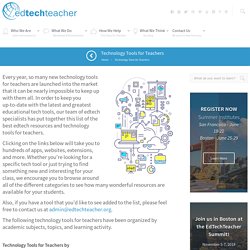
In order to keep you up-to-date with the latest and greatest educational tech tools, our team of edtech specialists has put together this list of the best edtech resources and technology tools for teachers. Clicking on the links below will take you to hundreds of apps, websites, extensions, and more. Whether you're looking for a specific tech tool or just trying to find something new and interesting for your class, we encourage you to browse around all of the different categories to see how many wonderful resources are available for your students. Also, if you have a tool that you'd like to see added to the list, please feel free to contact us at admin@edtechteacher.org. The following technology tools for teachers have been organized by academic subjects, topics, and learning activity. 50 Great EdTech Tools for Teachers and Educators ~ Educational Technology and Mobile Learning.
April, 2015 Looking for some powerful EdTech tools to try out in your class or probably use for your professional development?
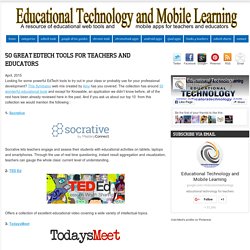
This Symbaloo web mix created by Amy has you covered. The collection has around 50 wonderful educational tools and except for Knowable, an application we didn’t know before, all of the rest have been already reviewed here in the past. SAMR Model - Technology Is Learning. Buckminster Fuller on an Economic System Based on Abundance not Scarcity. B. Fuller speaking on World Game, Boston College [Tape A] : Buckminster Fuller Stanford Archive. Visualizing Everything I Know. Buckminster Fuller and Systems Theory. R. Buckminster Fuller and Systems Theory 2004 stamp commemorating Buckminster Fuller1i In addition to being a successful architect and inventor, R Buckminster Fuller was also known as a systems philosopher.
He used the phrase “Spaceship Earth” to express the need for mankind to use teamwork to fully utilize Earth’s limited resources.1 Ephemeralization was another systems’ term coined by Fuller to express the concept of accomplishing more with fewer resources.2 His third system philosophy is Synergetics which is an attempt to combine various scientific disciplines to describe the energy output of an overall system exceeding the output from individual parts of a system.3 Table of Contents. Turning desert sand into farmland: Chinese scientists propose a revolutionary solution to desertification - Richard van Hooijdonk.